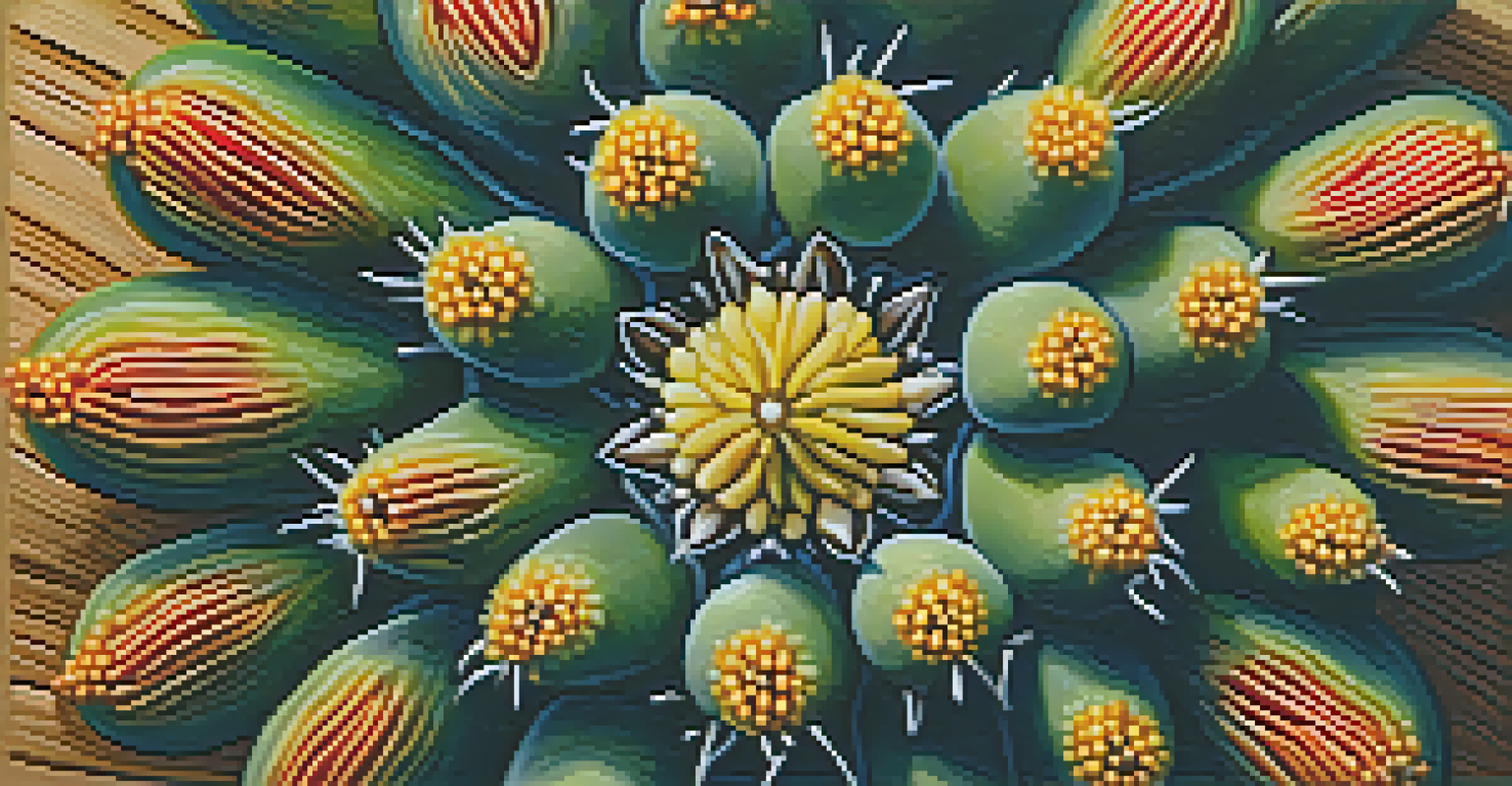Psychedelics and Epistemology: The Role of Peyote

Understanding Psychedelics: A Brief Overview
Psychedelics are substances that alter perception, mood, and cognitive processes. They have been used for centuries in various cultures, often in spiritual or therapeutic contexts. These substances, which include mushrooms, LSD, and peyote, can lead to profound experiences that challenge our understanding of reality.
The only thing we have to fear is fear itself.
By engaging with these substances, individuals often report insights into their consciousness and existence. This intersection of altered states and philosophical inquiry opens up questions about the nature of knowledge itself. Are our perceptions shaped more by our biology, or can psychedelics unveil deeper truths?
In essence, psychedelics act as a lens, helping us explore the depths of our mind and the world around us. This exploration invites us to rethink our epistemological frameworks—how we know what we know.
Peyote: A Unique Psychedelic Experience
Peyote is a small cactus that contains mescaline, a powerful psychedelic compound. Traditionally used by Indigenous peoples in North America, peyote has a rich history intertwined with spiritual practices and rituals. The experience of consuming peyote is often described as deeply introspective and spiritually revealing.

Users report vivid visual and auditory hallucinations, along with a heightened sense of connection to nature and the universe. These experiences can lead to profound insights about oneself and one's place in the world. For many, peyote serves as a tool for personal transformation and healing.
Psychedelics Alter Perception
Substances like peyote can lead to profound shifts in understanding reality and consciousness.
The unique properties of peyote distinguish it from other psychedelics, making it a focal point for understanding the broader implications of psychedelic use. This sets the stage for a discussion on how peyote contributes to our understanding of knowledge and perception.
Epistemology: What Do We Really Know?
Epistemology, the study of knowledge, questions the nature and scope of what we know. It deals with the sources, justification, and limits of knowledge, inviting us to consider how our beliefs are formed. This philosophical inquiry becomes particularly intriguing when we introduce psychedelics like peyote into the conversation.
The mind is everything. What you think you become.
When individuals undergo psychedelic experiences, they often report a shift in their understanding of reality. These experiences may challenge existing beliefs and prompt a reevaluation of what is considered true or false. This raises critical questions about the reliability of our senses and the frameworks we use to interpret our experiences.
By examining how peyote alters perception, we can better understand the complexities of knowledge itself. It encourages a dialogue about the subjective nature of reality and how altered states can expand our cognitive horizons.
The Cultural Significance of Peyote
Peyote holds significant cultural importance for many Indigenous communities, particularly in religious ceremonies. These rituals often involve communal gatherings where participants seek spiritual guidance and healing through the peyote experience. This cultural context enriches our understanding of how knowledge is shared and constructed within these communities.
The ritualistic use of peyote also emphasizes the collective aspect of knowledge acquisition. Participants often emerge with shared insights, reinforcing communal bonds and a shared understanding of reality. This contrasts sharply with the individualistic approach often seen in Western epistemology.
Cultural Context Shapes Knowledge
The communal and ritualistic use of peyote highlights how knowledge is constructed and shared within Indigenous communities.
By acknowledging the cultural significance of peyote, we can appreciate the diverse ways in which knowledge is understood and valued across different societies. This perspective highlights the importance of context in shaping our epistemological frameworks.
Psychedelics and Modern Science
In recent years, there has been a resurgence of interest in the scientific study of psychedelics, including peyote. Researchers are exploring their potential therapeutic benefits for mental health issues such as depression, anxiety, and PTSD. This scientific inquiry aims to bridge the gap between traditional uses and modern understanding.
Studies have shown that psychedelics can lead to lasting changes in perception, emotional well-being, and even personality. These findings challenge traditional views of cognition and suggest that our understanding of the mind is far more complex than previously thought. It raises questions about the nature of consciousness and how it can be influenced.
The intersection of modern science and traditional knowledge systems provides a rich avenue for exploration. As we study peyote and other psychedelics, we may uncover new insights into the human experience and the nature of knowledge itself.
Personal Insights: The Peyote Experience
For many individuals, consuming peyote is a deeply personal journey. Each experience is unique, shaped by one's thoughts, emotions, and environment. This subjectivity highlights the idea that knowledge gained through psychedelics is often deeply personal and may not be easily conveyed to others.
Participants often describe feelings of interconnectedness and a profound understanding of their place in the world. Such insights can lead to lasting changes in perspective, influencing how individuals approach life and relationships. This transformative potential underscores the importance of personal narratives in understanding knowledge.
Modern Science Explores Psychedelics
Recent research is uncovering the therapeutic potential of psychedelics, bridging traditional uses with contemporary scientific understanding.
The subjective nature of these experiences also raises questions about the universality of insights gained through peyote. While one person may find clarity and purpose, another may struggle to articulate their experiences. This variability adds richness to the conversation around psychedelics and epistemology.
The Future of Psychedelics and Knowledge
As the conversation around psychedelics continues to evolve, so too does our understanding of knowledge and reality. The growing acceptance of psychedelics in therapeutic settings opens doors for further exploration of their role in shaping human understanding. This presents an opportunity to integrate traditional practices with modern scientific approaches.
Future research could shed light on how psychedelics like peyote influence cognitive processes and perceptions of reality. By studying these effects, we may discover new pathways to understanding consciousness and the nature of knowledge. This could revolutionize our approach to education, therapy, and personal growth.

Ultimately, the journey of exploring peyote and its impact on epistemology invites us to reconsider how we understand knowledge itself. It challenges us to embrace the complexity of human experience and the diverse ways we seek understanding in our lives.